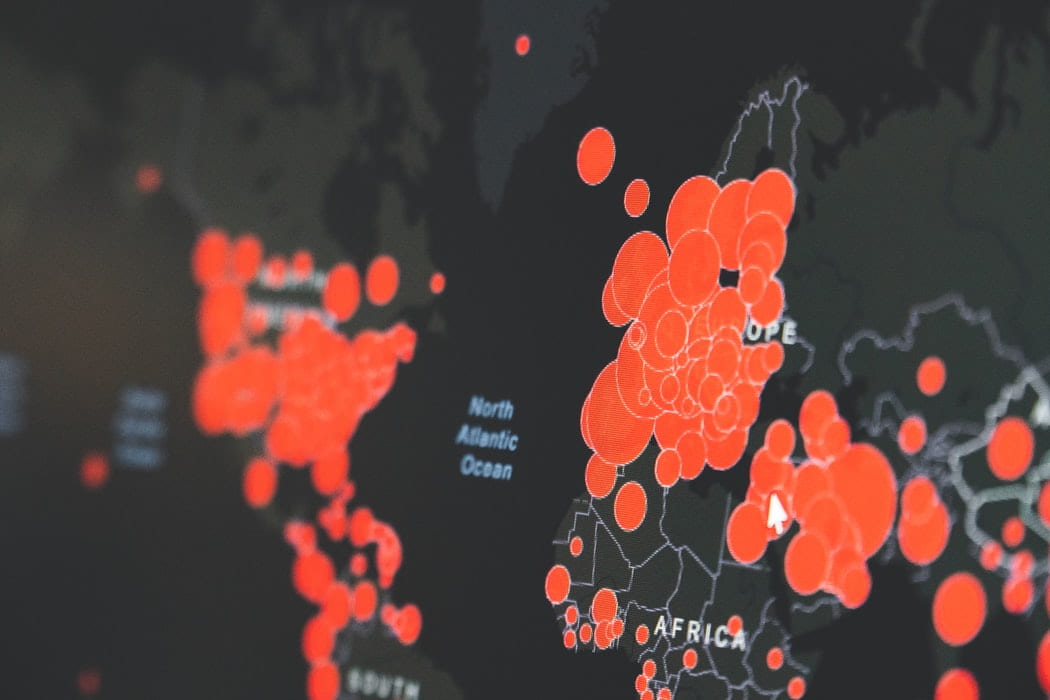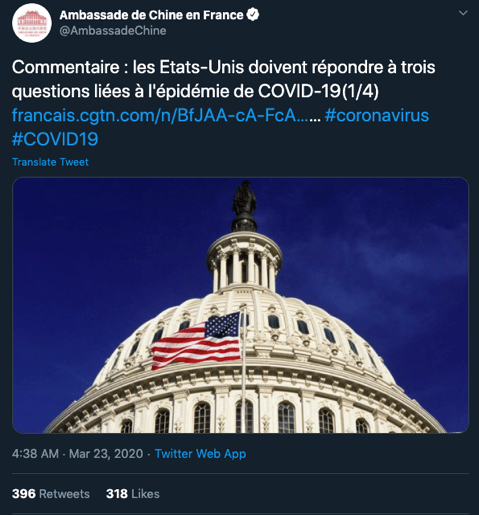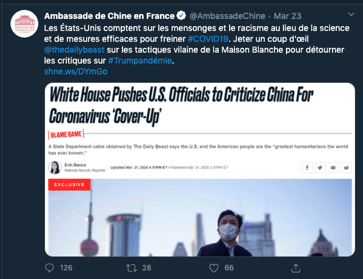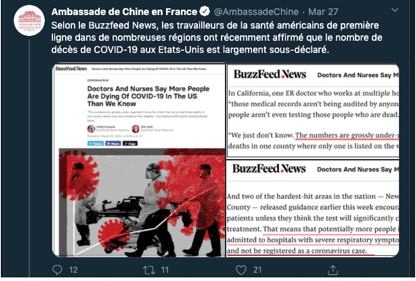Authors: Lukas Mejia and Marine Ragnet, May 2020.

Lukas and Marine’s Spring 2020 Capstone project examines Chinese avenues of influence across the Political, Military, Economic, Societal, Informational, and Infrastructural spectrums in a case study of France. Their aim has been to gather and assemble a taxonomy of Chinese influence operations under the context of changing Great-Power relations. This piece is an edited excerpt on Chinese Informational power in the context of the COVID-19 pandemic.
Image by Martin Sanchez.
An official press release by the Chinese Embassy in France recently affirmed that Chinese efforts to contain the COVID-19 pandemic were being regarded by French officials as an “inspiration” and a source of “admiration and envy” for the Chinese model of governance. “It was the ‘dictatorship’ to which the world first sought help from, and not the American flagship of democracy”, the release further read.
These words are just a snippet, demonstrating how attempts to shape the narrative around the pandemic have made Europe a battleground. Already tugged into the United States’ trade war with China, EU policymaking has faced difficult decisions in recent years over a range of topics including the Belt and Road Initiative or the adoption of 5G technology. Having been the epicenter of the pandemic’s spread this past month, Europe is now host to adversarial messaging emanating from the two global powers, highlighting its pivotal importance as well as its complicated road ahead.
Given the economic and reputational stakes involved for both countries, the Chinese Communist Party (CCP) seeks to discredit the United States’ (U.S.) health governance, while the current U.S. administration prefers to skirt past missteps at home by pointing the finger abroad. As a result, information operations —or operations centered on influencing, disrupting, corrupting, or otherwise usurping adversary decisionmamaking— has turned to instrumentalize the virus to promote one state’s grandeur over the other’s.
For China, projections estimate minimal, if not negative GDP growth for the year, compounded by a partial exodus in manufacturing. Given that CCP legitimacy is predicated on guarantees of economic success, a surge in nationalism is now part of its agenda. For the U.S., the outbreak could signify a GDP contraction of 24%, elevating unemployment to staggering levels. The U.S. leadership repeatedly refers to COVID-19 as the “Chinese virus”, and the continued gaslighting by the CCP as to the origins of the pandemic has led to the fracturing of multilateralism, leaving Europe’s liberal future in an uncertain position. A position where choosing between the two foremost economic powers promotes the destabilization of conventional trading alliances.
Since the crisis began, Chinese government officials’ activity on social media has increased exponentially, despite many platforms being banned in the mainland. The number of Twitter accounts connected to Chinese Embassies, Consulates, and ambassadors has increased by more than 250%. In Western Europe, Chinese embassies routinely showcase the mainland’s handling of the crisis and generosity with foreign interlocutors, vindicating its political model as a harbinger of stability, in comparison to the United States’.
In examining the Chinese government’s official Twitter sphere, narratives vary from praising the CCP in its efforts to combat the outbreak, critiquing Donald Trump’s handling of the pandemic, to casting doubt on the United States’ ability to manage the crisis. A public statement from the Chinese Embassy in Paris goes as far as to compare European political systems with those of China. These posts are then retweeted by Chinese embassies in francophone Africa, amplifying the narrative. The region has served as a testing ground for developing Chinese Ambassadors. For instance, Lu Shaye, present ambassador to Paris, began as ambassador to Dakar, Senegal. His predecessor, Zhai Jun, had also passed through North Africa.
CGTN’s French channel, which is part of China’s version of Russia Today, claimed that the United States might have been the origin of the virus with false evidence. The news agency further tweeted that, “Even if American politicians are loud, they are still unable to put the blame on others,” and “gray areas in the prevention and control of the epidemic in the United States are beginning to be highlighted.” This tweet received over 600 impressions, including by the Chinese Embassy in Paris.

In addition, CGTN’s podcast series has maintained that Xi Jinping is leading the fight against COVID-19, asserting that he “personally guided and deployed the Chinese people to lead the interception battle, which is also the people’s joint battle against the COVID-19 epidemic.” Episodes of the podcast were then shared by official Chinese government accounts on Twitter, including consulates and embassies across France and francophone Africa. These messages aimed to put tout China’s efforts in combating the outbreak while discrediting those of the United States.


The pandemic’s global repercussions have forced the CCP into taking a more confrontational approach to information manipulation that draws from Russian tactics. Its propaganda efforts are now bent on shaping the narrative behind the blame, figures, and containment related to the virus. China’s propaganda efforts have multiple goals. Internally, they seek to legitimize the regime in the eyes of domestic audiences after initial errors in crisis management. Externally, they seek to discredit Western democracies by highlighting their failures in coping with the outbreak. They even validate the claim that the Chinese diaspora can only feel safe in the mainland, as noted by Foreign Policy’s James Palmer. Overall, however, they seek to solidify the ascendance of China as a global superpower, the principal goal of President Xi Jinping’s 2050 vision for the country.
More generally, China’s propaganda push signifies a shift in how it exercises diplomacy. One that is more aggressive and spearheaded by the party’s “wolf-warrior” diplomats. Lu Shaye, the current ambassador of China to France is a perfect example of a recently promoted “wolf-warrior” and is well known for his provocative statements during his time across Canada, Africa and presently France. However, he risks undermining China’s relation to France, and the EU at large. “The aggressive attitude of the PRC embassy in France is a new phenomenon that risks undermining the views of China in France, including within the government” writes Marc Julienne for IFRI “and that could affect bilateral relations. This could, for instance, push France toward banning Huawei from the French 5G market.” Analysts assess that China’s change might be the consequence of its current internal vulnerability, pressing for a more frontal external response.
Responses from the French government have seen President Emmanuel Macron calling for more transparency regarding the initial management of the outbreak by Chinese authorities. While Minister of Foreign Affairs Jean-Yves Le Drian called on the Chinese ambassador in Paris to express disapproval of certain recent comments when the ambassador added that the remarks were not in line with the “quality of the bilateral relationship” between the two countries. But where the initial government reaction seemed condemning, the trend seems to have cooled in recent weeks — EU lawmakers, for instance, have decided to review a condemning report on Chinese Covid-19-related disinformation by softening the accusatory language and tone.
But China’s propaganda has also been faced with responses on the American front. Conservative figures such as Senator Tom Cotton have led the charge, openly spreading a corrosive theory claiming that the virus originated in a laboratory in Wuhan – claims that have found resonance within far-right populist circles in France. Compounded with Representative Paul Gosar’s coinage of the “Wuhan Virus” moniker and Mitt Romney’s call for a National Security Council task force, the current U.S. administration is on course to pursue a path that further degrades the multilateralism system it helped create.
In a world where China is sufficiently confident in its global narrative on global health governance, and where the U.S. pronounces its supposed exceptionalism over ally or foe alike — many other western democracies find themselves caught between a rock and a hard place. On one end, they are offered help by a regime that asks for little but the acceptance of its narrative. On the other end, they are annulled aid by a historic ally that has resorted to nationalism. And in the absence of a response from the United States, the pandemic has paved the way for China to bolster its ambitions and validate its political values. These ambitions may lead to the legitimization of authoritative narratives around governance and the materialization of a new form of multilateralism, teased by its ability to shape discourse around institutions like the World Health Organization and the United Nations Security Council. European countries should remain wary of the price of a China-revised multilateralist system, shaped by ambitions where human rights and transparency are likely to be neglected.
Leave a Reply
You must be logged in to post a comment.